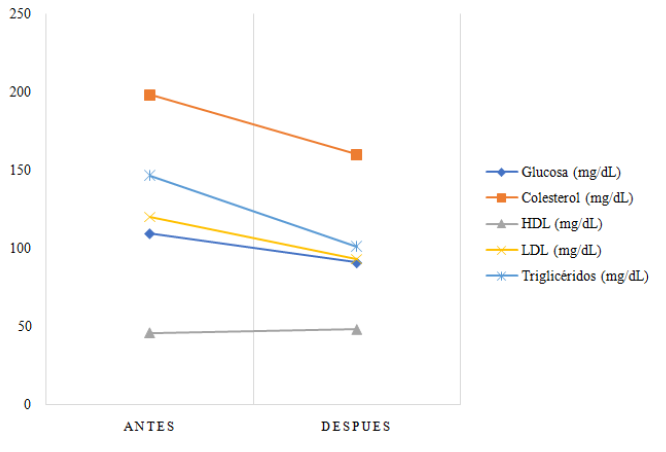Biochemical and anthropometric changes in patients undergoing bariatric surgery in a referral hospital, Paraguay
Main Article Content
Abstract
Introduction: bariatric surgery constitutes an alternative treatment for obesity, being the onethatpresents the bestresults in weightloss and remission of comorbidities and, as a result, anincrease in the quality of life in the longterm.
Objective: to determine the biochemical and anthropometric changes in patients with obesity under going bariatric surgery at the Hospital General de Luque during the period 2018-2023.
Methodology: descriptive observational study, with secondary data collected from the clinical records of patients undergoing bariatric surgery during the period 2018-2023. Non-probabilistic sampling of consecutive cases. Demographic, clinical, biochemical and anthropometric data were collected before and after (6 months) surgery. They were analyzed in SPSS version 23.
Results: twenty-two clinical records wereincluded, 86.4 % (n = 19) were female, the mean age was 43 years. Among the clinical characteristics, the average age at onset of overweight was 24.6±8.2 years, the main reasons for weight gain being changes in physicalactivity (36.4 %) and stress (31.8 %). In the biochemical parameters, a significant difference was found with adecrease in the values of glucose, total cholesterol, LDL and triglycerides (p<0.05). Accordingto the bodymass index before bariatric surgery, 90.2 % (n = 20) had class III obesity, at 6 months after surgery 50 % had class I, therefore a significant difference was found.
Conclusion: changes in anthropometric and clinical parameters were observed in patients submitted to bariatric surgery.
Article Details

This work is licensed under a Creative Commons Attribution 4.0 International License.
Usted es libre de:
- Compartir: copiar y redistribuir el material en cualquier medio o formato para cualquier propósito, incluso comercialmente.
- Adaptar: remezclar, transformar y construir a partir del material para cualquier propósito, incluso comercialmente.
- La licenciante no puede revocar estas libertades en tanto usted siga los términos de la licencia
Bajo los siguientes términos:
- Atribución: Usted debe dar crédito de manera adecuada, brindar un enlace a la licencia, e indicar si se han realizado cambios. Puede hacerlo en cualquier forma razonable, pero no de forma tal que sugiera que usted o su uso tienen el apoyo de la licenciante.
- Compartir igual: — Si remezcla, transforma o crea a partir del material, debe distribuir su contribución bajo la misma licencia del original.
- No hay restricciones adicionales — No puede aplicar términos legales ni medidas tecnológicas que restrinjan legalmente a otras a hacer cualquier uso permitido por la licencia.
References
Zambrano JV, Miranda A, Pulgar M, Araujo P, Salazar C. Evaluación de la calidad de vida en pacientes obesos y cirugía bariátrica. Revista Ciencias Biomédicas. 2020;5(1):79-87. doi: 10.32997/rcb-2014-2891
Delgadillo Arteaga B, Nava-González E. Éxito de la Cirugía Bariátrica: perspectiva biológica. Rev Nutr Clínica y Metab. 2021;4(4):32-9. doi: 10.35454/rncm.v4n4.286
Builes-Gutiérrez A, Ortiz-Ramírez L, Valencia-Urrea P, López-Pompey N. Características clínicas, bioquímicas y complicaciones de los pacientes sometidos a la cirugía bariátrica con 18 meses de seguimiento en un hospital de alta complejidad. Iatreia. 2019;32(1):16-24. doi: 10.17533/udea.iatreia.v32n1a02
Paraguay, Ministerio de Salud Pública y Bienestar Social, Dirección de Vigilancia de Enfermedades No Transmisibles. Segunda Encuesta Nacional de Factores de Riesgo para Enfermedades no transmisibles. 2023. Disponible en: https://www.ine.gov.py/Publicaciones/Biblioteca/documento/223/ENFR%202022.pdf
Yegros Ortiz CD, Duarte DB, Montiel Alfonso MA, Feltes Villalba SC. Resultados de la cirugía bariátrica en pacientes obesos internados en el Hospital Nacional de Itauguá. An. Fac. Cienc. Méd.2022; 55(3): 43-50. doi: 10.18004/anales/2022.055.03.43
Cañete F, Fretes G, Sequera VG, Turnes C, Santacruz E, Paiva T, et al. Epidemiología de la obesidad en Paraguay. Anales de la Facultad de Ciencias Médicas (Asunción). 2016;49(2):17-26. doi: 10.18004/anales/2016.049(02)17-026
Aranda Wildberger MÁ, PetryBottini C, Wildberger De Aranda CA. Morbimortalidad de pacientes sometidos a cirugía bariátrica en el Hospital Nacional de Itauguá: experiencia años 2017 a 2021. RevNac (Itauguá). 2022;14(2):18-29. doi: 10.18004/rdn2022.dic.02.018.029
Toro-Vásquez JP, Moncada-Osorio V, Morales-Uribe CH. Cirugía bariátrica: resultados clínicos en términos de pérdida de peso y resolución de comorbilidades. Rev Colomb Cir. 2023;38:642-55. doi: 10.30944/20117582.2331
Medina-Bordón LM, Mersch-Denis GI, Aguilar-Rabito AC, Acosta Escobar JMM. Factores asociados al trastorno por atracón en adultos con obesidad del microcentro de San Lorenzo, Paraguay. MemInstInvestigCienc Salud. 2022;20(2):48-58. doi: 10.18004/mem.iics/1812-9528/2022.020.02.48
Głuszek S, Bociek A, Suliga E, Matykiewicz J, Kołomańska M, Bryk P, et al. The Effect of Bariatric Surgery onWeightLoss and MetabolicChanges in Adults with Obesity. IJERPH. 2020;17(15):5342. doi: 10.3390/ijerph17155342
Ballesteros JS, Hernández ID. Manejo y seguimiento nutricional de los pacientes con cirugía bariátrica en Colombia. RevNutrClin Metab.2018;1(1):26-34. doi: 10.35454/rncm.v1n1.074
Kaska L, Sledzinski T, Chomiczewska A, Dettlaff-Pokora A, Swierczynski J. Improved glucose metabolism following bariatric surgery is associated with in creased circulating bileacid concentrations and remodeling of the gutmicrobiome. WJG. 2016;22(39):8698. doi: 10.3748/wjg.v22.i39.8698
Ackerman M, Serra E, Nogueira. Efecto selectivo de la cirugía bariátrica sobre el metabolismo lipídico. Revista Argentina de Lípidos. 4(2):1-7. Disponible en: http://portal.amelica.org/ameli/jatsRepo/450/4502665002/index.html
Feingold KR. Obesity and Dyslipidemia. En: Feingold KR, Anawalt B, Blackman MR, Boyce A, Chrousos G, Corpas E, et al., editores. Endotext [Internet]. South Dartmouth (MA): MDText.com, Inc.; 2000 [citado 16 de febrero de 2024]. Disponible en: http://www.ncbi.nlm.nih.gov/books/NBK305895/
Cazorla G, Shinin Estrada E, Solis Cartas. Efectividad de la cirugía bariátrica en el tratamiento de la obesidad. Eugenio Espejo. 2022;16(2):25-34. doi: 10.37135/ee.04.14.04
Cardozo-Mangones M, Hernández-Salgado A, Loaiza-Fernández L. Efectividad de la gastrectomía en manga por laparoscopia. Revista Ciencias Biomédicas. 2015;6(1):45-52. doi: 10.32997/rcb-2015-2982
Barrientos-Sánchez F, De León LG, Candia-Luján R, Ortiz-Rodríguez B. Physical exercise and loss of weight and bodymass index in bariatric surgery: a systematic review. NutrHosp [Internet]. 2021 [citado 11 de febrero de 2024]; Disponible en: https://www.nutricionhospitalaria.org/articles/03746/show
Ugarte C, Quiñones Á, Bustos C, Vicente B. Porcentaje de peso perdido y su recuperación en pacientes bariátricos: un análisis desde la perspectiva temporal. Revchilnutr. 2020;47(1):41-9. doi: 10.4067/S0717-7518202000010004
